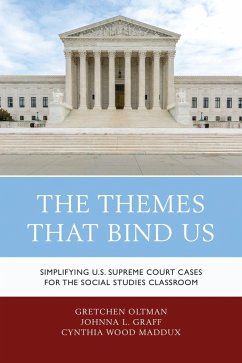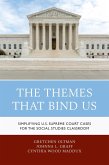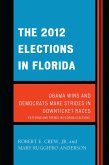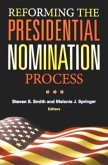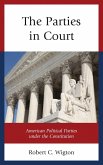Gretchen Oltman, Johnna L. Graff, Cynthia Wood Maddux
The Themes That Bind Us (eBook, PDF)
Simplifying U.S. Supreme Court Cases for the Social Studies Classroom
38,95 €
38,95 €
inkl. MwSt.
Sofort per Download lieferbar

19 °P sammeln
38,95 €
Als Download kaufen

38,95 €
inkl. MwSt.
Sofort per Download lieferbar

19 °P sammeln
Jetzt verschenken
Alle Infos zum eBook verschenken
38,95 €
inkl. MwSt.
Sofort per Download lieferbar
Alle Infos zum eBook verschenken

19 °P sammeln
Gretchen Oltman, Johnna L. Graff, Cynthia Wood Maddux
The Themes That Bind Us (eBook, PDF)
Simplifying U.S. Supreme Court Cases for the Social Studies Classroom
- Format: PDF
- Merkliste
- Auf die Merkliste
- Bewerten Bewerten
- Teilen
- Produkt teilen
- Produkterinnerung
- Produkterinnerung

Bitte loggen Sie sich zunächst in Ihr Kundenkonto ein oder registrieren Sie sich bei
bücher.de, um das eBook-Abo tolino select nutzen zu können.
Hier können Sie sich einloggen
Hier können Sie sich einloggen
Sie sind bereits eingeloggt. Klicken Sie auf 2. tolino select Abo, um fortzufahren.

Bitte loggen Sie sich zunächst in Ihr Kundenkonto ein oder registrieren Sie sich bei bücher.de, um das eBook-Abo tolino select nutzen zu können.
Teaching U.S. Supreme Court cases can be a daunting task for any social studies teacher, but this book can ease that process. Carefully aligned with the NCSS' Ten Themes, this teacher's guide provides thirty-two high-interest U.S. Supreme Court cases edited to a more reader-friendly format while retaining the original verbiage. Features of each chapter include pre-reading, during-reading, and post-reading questions, as well as teaching extensions to help students better understand the stories behind the cases, the intricacies of the laws involved, and the effects of the Court's decisions on…mehr
- Geräte: PC
- mit Kopierschutz
- eBook Hilfe
- Größe: 3.22MB
Andere Kunden interessierten sich auch für
![The Themes That Bind Us (eBook, ePUB) The Themes That Bind Us (eBook, ePUB)]() Gretchen OltmanThe Themes That Bind Us (eBook, ePUB)38,95 €
Gretchen OltmanThe Themes That Bind Us (eBook, ePUB)38,95 €![The 2012 Elections in Florida (eBook, PDF) The 2012 Elections in Florida (eBook, PDF)]() Robert E. Crew Jr.The 2012 Elections in Florida (eBook, PDF)21,95 €
Robert E. Crew Jr.The 2012 Elections in Florida (eBook, PDF)21,95 €![The Impeachment of Chief Justice David Brock (eBook, PDF) The Impeachment of Chief Justice David Brock (eBook, PDF)]() John CerulloThe Impeachment of Chief Justice David Brock (eBook, PDF)84,95 €
John CerulloThe Impeachment of Chief Justice David Brock (eBook, PDF)84,95 €![Reforming the Presidential Nomination Process (eBook, PDF) Reforming the Presidential Nomination Process (eBook, PDF)]() Reforming the Presidential Nomination Process (eBook, PDF)16,95 €
Reforming the Presidential Nomination Process (eBook, PDF)16,95 €![The Parties in Court (eBook, PDF) The Parties in Court (eBook, PDF)]() Robert C. WigtonThe Parties in Court (eBook, PDF)45,95 €
Robert C. WigtonThe Parties in Court (eBook, PDF)45,95 €![The Roads to Congress 2014 (eBook, PDF) The Roads to Congress 2014 (eBook, PDF)]() The Roads to Congress 2014 (eBook, PDF)96,95 €
The Roads to Congress 2014 (eBook, PDF)96,95 €![The 2012 Nomination and the Future of the Republican Party (eBook, PDF) The 2012 Nomination and the Future of the Republican Party (eBook, PDF)]() The 2012 Nomination and the Future of the Republican Party (eBook, PDF)39,95 €
The 2012 Nomination and the Future of the Republican Party (eBook, PDF)39,95 €-
-
-
Teaching U.S. Supreme Court cases can be a daunting task for any social studies teacher, but this book can ease that process. Carefully aligned with the NCSS' Ten Themes, this teacher's guide provides thirty-two high-interest U.S. Supreme Court cases edited to a more reader-friendly format while retaining the original verbiage. Features of each chapter include pre-reading, during-reading, and post-reading questions, as well as teaching extensions to help students better understand the stories behind the cases, the intricacies of the laws involved, and the effects of the Court's decisions on American life. This book provides any teacher with viable, useable case law to fit any historical timeframe or unit of study.
Produktdetails
- Produktdetails
- Verlag: Bloomsbury eBooks US
- Seitenzahl: 264
- Erscheinungstermin: 15. Juli 2018
- Englisch
- ISBN-13: 9798216292364
- Artikelnr.: 74832192
- Verlag: Bloomsbury eBooks US
- Seitenzahl: 264
- Erscheinungstermin: 15. Juli 2018
- Englisch
- ISBN-13: 9798216292364
- Artikelnr.: 74832192
- Herstellerkennzeichnung Die Herstellerinformationen sind derzeit nicht verfügbar.
Gretchen Oltman has spent the past decade building and leading new academic programs. She is a tenured associate professor and program director of a graduate program at Creighton University in Omaha, Nebraska. A lifelong educator, she also holds a Ph.D. in educational studies, a law degree, and a master's degree in teaching.
Chronological Timeline of Cases
Cases Organized by Big Ideas
Chapter 1- Why Teach Students to Read Case Law in the Social Studies
Classroom?
What is an Appropriate Primary Document to Teach?
Connecting Case Law to the "Big Ideas" in the Social Studies Classroom
The Importance of Teaching Disciplinary Reading
The Teacher's Role in Teaching Case Law
How Cases Were Selected, Prepared, and Edited for this Text
A Note from the Authors
Chapter 2- How to Use this Book
Understanding the Themes of The National Curriculum Standards for Social
Studies
Teaching Students to Read a Case
How Cases were Prepared for this Book
A Sample Case
Resources Beyond the Cases
A Note from the Authors
Chapter 3- Culture
Meyer v. State of Nebraska
Brown v. Board of Education of Topeka
County of Allegheny v. American Civil Liberties Union
A Note from the Authors
Chapter 4- Time, Continuity, and Change
Marbury v. Madison
Whitney v. California
Brandenburg v. Ohio
South Carolina v. Gathers
Payne v. Tennessee
A Note from the Authors
Chapter 5- People, Places, and Environments
United States v. Amistad
Kelo v. City of New London
Michigan v. Environmental Protection Agency
A Note from the Authors
Chapter 6- Individual Development and Identity
In re Gault
Loving v. Virginia
Wisconsin v. Yoder
A Note from the Authors
Chapter 7- Individuals, Groups, And Institutions
Korematsu v United States
Adler v. Board of Education of City of New York
Sherbert v. Verner
A Note from the Authors
Chapter 8- Power, Authority, and Governance
Gideon v. Wainwright
Miranda v. Arizona
Tinker v. Des Moines Independent Community School District
A Note from the Authors
Chapter 9- Production, Distribution, and Consumption
Swift & Co. v. United States
United States v. 95 Barrels of Vinegar
Gonzales v. Raich
A Note from the Authors
Chapter 10- Science, Technology, and Society
United States v. American Library Association, Inc.
United States v. Jones
Maryland v. King
A Note from the Authors
Chapter 11- Global Connections
Roper v. Simmons
Medellin v. Texas
Maselenjak v. United States
A Note from the Authors
Chapter 12- Civic Ideals and Practices
Edwards v. South Carolina
Texas v. Johnson
Shelby County v. Holder
A Note from the Authors
Bibliography
Index
About the Authors
Cases Organized by Big Ideas
Chapter 1- Why Teach Students to Read Case Law in the Social Studies
Classroom?
What is an Appropriate Primary Document to Teach?
Connecting Case Law to the "Big Ideas" in the Social Studies Classroom
The Importance of Teaching Disciplinary Reading
The Teacher's Role in Teaching Case Law
How Cases Were Selected, Prepared, and Edited for this Text
A Note from the Authors
Chapter 2- How to Use this Book
Understanding the Themes of The National Curriculum Standards for Social
Studies
Teaching Students to Read a Case
How Cases were Prepared for this Book
A Sample Case
Resources Beyond the Cases
A Note from the Authors
Chapter 3- Culture
Meyer v. State of Nebraska
Brown v. Board of Education of Topeka
County of Allegheny v. American Civil Liberties Union
A Note from the Authors
Chapter 4- Time, Continuity, and Change
Marbury v. Madison
Whitney v. California
Brandenburg v. Ohio
South Carolina v. Gathers
Payne v. Tennessee
A Note from the Authors
Chapter 5- People, Places, and Environments
United States v. Amistad
Kelo v. City of New London
Michigan v. Environmental Protection Agency
A Note from the Authors
Chapter 6- Individual Development and Identity
In re Gault
Loving v. Virginia
Wisconsin v. Yoder
A Note from the Authors
Chapter 7- Individuals, Groups, And Institutions
Korematsu v United States
Adler v. Board of Education of City of New York
Sherbert v. Verner
A Note from the Authors
Chapter 8- Power, Authority, and Governance
Gideon v. Wainwright
Miranda v. Arizona
Tinker v. Des Moines Independent Community School District
A Note from the Authors
Chapter 9- Production, Distribution, and Consumption
Swift & Co. v. United States
United States v. 95 Barrels of Vinegar
Gonzales v. Raich
A Note from the Authors
Chapter 10- Science, Technology, and Society
United States v. American Library Association, Inc.
United States v. Jones
Maryland v. King
A Note from the Authors
Chapter 11- Global Connections
Roper v. Simmons
Medellin v. Texas
Maselenjak v. United States
A Note from the Authors
Chapter 12- Civic Ideals and Practices
Edwards v. South Carolina
Texas v. Johnson
Shelby County v. Holder
A Note from the Authors
Bibliography
Index
About the Authors
Chronological Timeline of Cases
Cases Organized by Big Ideas
Chapter 1- Why Teach Students to Read Case Law in the Social Studies
Classroom?
What is an Appropriate Primary Document to Teach?
Connecting Case Law to the "Big Ideas" in the Social Studies Classroom
The Importance of Teaching Disciplinary Reading
The Teacher's Role in Teaching Case Law
How Cases Were Selected, Prepared, and Edited for this Text
A Note from the Authors
Chapter 2- How to Use this Book
Understanding the Themes of The National Curriculum Standards for Social
Studies
Teaching Students to Read a Case
How Cases were Prepared for this Book
A Sample Case
Resources Beyond the Cases
A Note from the Authors
Chapter 3- Culture
Meyer v. State of Nebraska
Brown v. Board of Education of Topeka
County of Allegheny v. American Civil Liberties Union
A Note from the Authors
Chapter 4- Time, Continuity, and Change
Marbury v. Madison
Whitney v. California
Brandenburg v. Ohio
South Carolina v. Gathers
Payne v. Tennessee
A Note from the Authors
Chapter 5- People, Places, and Environments
United States v. Amistad
Kelo v. City of New London
Michigan v. Environmental Protection Agency
A Note from the Authors
Chapter 6- Individual Development and Identity
In re Gault
Loving v. Virginia
Wisconsin v. Yoder
A Note from the Authors
Chapter 7- Individuals, Groups, And Institutions
Korematsu v United States
Adler v. Board of Education of City of New York
Sherbert v. Verner
A Note from the Authors
Chapter 8- Power, Authority, and Governance
Gideon v. Wainwright
Miranda v. Arizona
Tinker v. Des Moines Independent Community School District
A Note from the Authors
Chapter 9- Production, Distribution, and Consumption
Swift & Co. v. United States
United States v. 95 Barrels of Vinegar
Gonzales v. Raich
A Note from the Authors
Chapter 10- Science, Technology, and Society
United States v. American Library Association, Inc.
United States v. Jones
Maryland v. King
A Note from the Authors
Chapter 11- Global Connections
Roper v. Simmons
Medellin v. Texas
Maselenjak v. United States
A Note from the Authors
Chapter 12- Civic Ideals and Practices
Edwards v. South Carolina
Texas v. Johnson
Shelby County v. Holder
A Note from the Authors
Bibliography
Index
About the Authors
Cases Organized by Big Ideas
Chapter 1- Why Teach Students to Read Case Law in the Social Studies
Classroom?
What is an Appropriate Primary Document to Teach?
Connecting Case Law to the "Big Ideas" in the Social Studies Classroom
The Importance of Teaching Disciplinary Reading
The Teacher's Role in Teaching Case Law
How Cases Were Selected, Prepared, and Edited for this Text
A Note from the Authors
Chapter 2- How to Use this Book
Understanding the Themes of The National Curriculum Standards for Social
Studies
Teaching Students to Read a Case
How Cases were Prepared for this Book
A Sample Case
Resources Beyond the Cases
A Note from the Authors
Chapter 3- Culture
Meyer v. State of Nebraska
Brown v. Board of Education of Topeka
County of Allegheny v. American Civil Liberties Union
A Note from the Authors
Chapter 4- Time, Continuity, and Change
Marbury v. Madison
Whitney v. California
Brandenburg v. Ohio
South Carolina v. Gathers
Payne v. Tennessee
A Note from the Authors
Chapter 5- People, Places, and Environments
United States v. Amistad
Kelo v. City of New London
Michigan v. Environmental Protection Agency
A Note from the Authors
Chapter 6- Individual Development and Identity
In re Gault
Loving v. Virginia
Wisconsin v. Yoder
A Note from the Authors
Chapter 7- Individuals, Groups, And Institutions
Korematsu v United States
Adler v. Board of Education of City of New York
Sherbert v. Verner
A Note from the Authors
Chapter 8- Power, Authority, and Governance
Gideon v. Wainwright
Miranda v. Arizona
Tinker v. Des Moines Independent Community School District
A Note from the Authors
Chapter 9- Production, Distribution, and Consumption
Swift & Co. v. United States
United States v. 95 Barrels of Vinegar
Gonzales v. Raich
A Note from the Authors
Chapter 10- Science, Technology, and Society
United States v. American Library Association, Inc.
United States v. Jones
Maryland v. King
A Note from the Authors
Chapter 11- Global Connections
Roper v. Simmons
Medellin v. Texas
Maselenjak v. United States
A Note from the Authors
Chapter 12- Civic Ideals and Practices
Edwards v. South Carolina
Texas v. Johnson
Shelby County v. Holder
A Note from the Authors
Bibliography
Index
About the Authors
